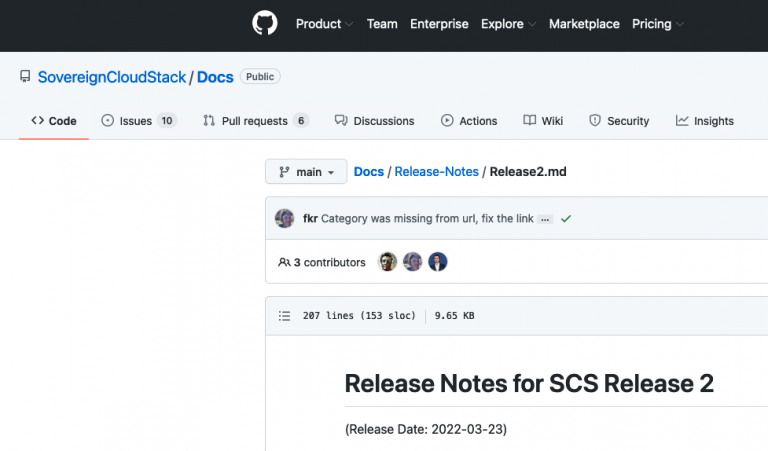Update of the central components to OpenStack Xena, OSISM 3.0.0 as well as Kubernetes Cluster API 1.0.x
The Sovereign Cloud Stack, funded by the German Federal Ministry for Economic Affairs and Climate Protection, released today its third version. Highlights of Release 2 are the updating of all open source components and the simplified provision of operational tools and Kubernetes clusters, in particular the realized connectivity to the Gaia-X Federation Services (GXFS).

“Through open source, open standards and an open development process, the Sovereign Cloud Stack makes an important contribution to reducing lock-in effects in the cloud sector, creating freedom of choice and thus strengthens the progress of digitalization in Europe – with full control over technology and data.” Peter Ganten, Chairman of the Board of the Open Source Business Alliance e.V., summarizes the motivation of the SCS project.
Technical innovations in SCS Release 2
In detail, the following technical highlights, among others, were realized with Release 2:
- Update of the central components to OpenStack Xena, OSISM 3.0.0 as well as Kubernetes Cluster API 1.0.x with support for Kubernetes 1.22 and 1.23.
- Automation in the installation of bare-metal hardware was massively expanded. The configuration and management of components is now comprehensively handled by the data in Netbox. This means that even installations with a four-digit number of machines can be installed and managed with manageable operational effort.
- Automation based on the Kubernetes Cluster API for managing Kubernetes clusters is now designed to manage many differently configured clusters. These clusters can now be created in different projects and availability zones, and their other settings are independent of each other. This means that different Kubernetes versions, different network integration (CNI), different numbers and types (flavors) of machines, and an independent selection of default services. The configuration is maintained in a git repository.
- Kubernetes container management has been enhanced with standard services for flux (gitops) and cert-manager (certificate management), the ingress-nginx has been improved, and the administration now offers the option to use cilium instead of calico as a network integration. This saves users (DevOps teams)work and they have not to worry about smooth integration.
- The quality of these developments is confirmed by the constant conformity tests carried out by the Cloud Native Computing Foundation and the Open Infrastructure Foundation.
- The SCS standards on image metadata and virtual machine flavor naming published on the occasion of Release 1 have been flavors for virtual machines have been comprehensively implemented. This makes it easier to perform automated installations (infrastructure-as-code) without having to deal with a multitude of differences in detail.
- The user federation components required to connect to Gaia-X Federation Services (GXFS) have been completed. The Gaia-X Federation Services will be used to link the various Gaia-X services. With this, a very important milestone of SCS for Gaia-X has been reached.
The full release notes are available on GitHub at https://github.com/SovereignCloudStack/Docs.
Implemented in an open development process, the Sovereign Cloud Stack (SCS) technology is being tested by a growing number of companies and IT service providers in the public sector and is already being operated productively by two, soon to be three, public cloud providers. The C5 certification of the partner PlusServer also prove that the Sovereign Cloud Stack meets the high security requirements of the German of the German Federal Office for Information Security (BSI). Through its participation in the working groups of Gaia-X and the German Administration Cloud Strategy (DVS) the Sovereign Cloud Stack project ensures that the jointly developed standards and the reference implementation from the project also satisfy the requirements from these important initiatives. The Sovereign Cloud Stack thus not only provides a technical foundation for Gaia-X-compliant infrastructure and services, but also for a resilient, federatable public sector cloud.
The key areas for Release 3, due in the fall of 2022, are the completion of previous work on disk encryption, the expansion of federation capabilities, and the development of fully automated SCS compliance tests. The latter are intended to enable already established cloud service providers to adapt their own offerings to the standard developed by SCS. The goal of the Sovereign Cloud Stack is to develop an open source-based toolbox for a sovereign, standardized cloud infrastructure.
